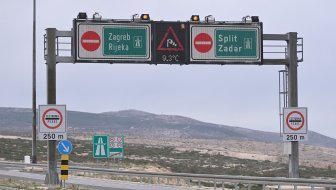The Croatian Chief Public Prosecutor's Office (DORH) notified the Prosecutor's Office at the International Criminal Tribunal for the former Yugoslavia (ICTY) in The Hague in 2008 that it was ready to try Goran Hadzic and that it expected that based on the international arrest warrant issued by Croatia the leader of the Serb insurgency in Eastern Slavonia would be handed over to the Croatian judicial authorities to stand trial for serious crimes, the DORH said on its website on Thursday.
Hadzic, the last remaining fugitive sought by the ICTY, was arrested in Serbia on Wednesday. The DORH had initiated proceedings against him in three cases, in two of which he was found guilty and sentenced in his absence, while in a third one he was indicted.
Prime Minister Jadranka Kosor said on Wednesday that it would be logical for Croatia to request his extradition. She said that, considering that fact that he was to be extradited to the Hague tribunal, she would consult the ICTY and the DORH "to see what is realistic".
In 1995, the Sibenik County Court sentenced Hadzic to 20 years in prison for excessive shelling of the Sibenik and Vodice areas in 1993, in which banned missiles were used. He was found guilty because in his capacity as President of the self-styled Republic of Serb Krajina (RSK) he gave orders for attacks on Sibenik and its surroundings, in which civilians were killed and wounded and historical monuments were destroyed. The orders were given, in consultation with RSK defence minister Djordje Bjegovic, to military commander Mile Novakovic, who is under investigation in Croatia, and his deputy Kosta Novakovic.
In 1999, the Osijek County Court sentenced Hadzic to eight years in prison for incitement to murder and expulsions of Croats and other non-Serbs from the Osijek suburb of Tenja in 1991 and 1992. At that time, Hadzic served as head of government of the self-proclaimed Serb Autonomous District of Eastern Slavonia, Baranja and Western Srijem. He was found guilty of inciting local Serbs to organise themselves militarily and drive out the non-Serb population, and to destroy their cultural monuments. For that purpose, the Serb Territorial Defence and other paramilitary units were set up in Tenja, using Croats and other non-Serbs as forced labour, restricting their movement, intimidating them and threatening to kill them, looting their property, blowing up their homes, and killing 23 people. On April 20, 1992, they expelled 98 Croats and other non-Serbs from Tenja.
In 2002, the Vukovar County Prosecutor's Office issued an indictment against Hadzic for war crimes committed in Vukovar. According to the indictment, 1,007 civilians and Croatian soldiers were killed and 2,453 people were wounded during attacks on Vukovar. Also indicted in this case were senior Yugoslav People's Army (JNA) officers Veljko Kadijevic, Blagoje Adzic, Zvonko Jurjevic, Bozidar Stevanovic, Mile Mrksic, Veselin Sljivancanin and Miroslav Radic, as well as Serbian Radical Party leader Vojislav Seselj, who is on trial at the Hague tribunal.
Hadzic and the others are charged with issuing and carrying out orders during the aggression by the JNA and Serb paramilitary forces between August and November 1991 with the aim of expelling and killing all the non-Serb population of Vukovar, destroying the historical monuments of the Croatian people and occupying the Croatian territory, in violation of international conventions.
Two more indictments were later attached to this one - one issued by the Bjelovar County Court in November 1992 against Kadijevic and Jurjevic and one issued by the Osijek County Court in November 2007 against Radic.
The DORH said that since 2007 it had searched the ICTY databases and obtained documents that could provide important evidence in this case and in other cases against members of the JNA and Serb paramilitary forces for war crimes committed in Croatia and in concentration camps in Serbia. The DORH said that some of the documents had also been obtained from the Serbian War Crimes Prosecutor's Office.
The DORH said it had provided the ICTY Prosecutor's Office with information about possible locations where Hadzic had been hiding before he was arrested on Mount Fruska Gora in Serbia on Wednesday.

































